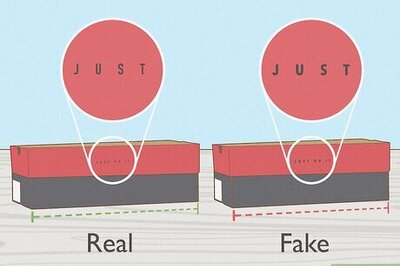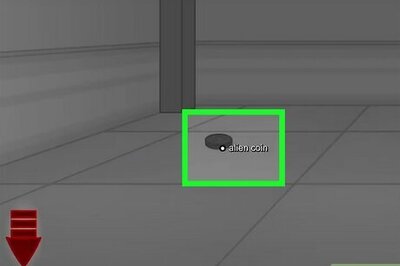
views
Getting Help from the Pharmacy

Take something for the pain. When you start to feel the symptoms of dysmenorrhea (like cramps), you should take some over-the-counter pain medicine to help you handle the pain. You can even take some pain medicine right when you begin your period to try to keep the pain at bay. Try taking something like ibuprofen or naproxen. These are the best over-the-counter medicines for cramps. Follow the manufacturer’s instructions for dosing.

Try a heating pad. If you are feeling a lot of pain and the pain medicine doesn't seem to be helping, try using a heating pad. Simply applying heat to your lower back or abdomen (depending on where you feel the most pain) can have amazing effects and make you feel so much better. You can also try an adhesive heating pad. This is a good option if you are on the go and can’t sit and hold a heating pad against your body.

Take oral contraceptives or another type of hormonal birth control. If you have severe cramps during your period, ask your doctor about hormonal birth control. Some people can be helped a lot by using birth control pills, hormonal IUDs, implants, injections, or patches. Regular use of oral contraceptives usually shortens the period and even lessens the pain in some women. Using a birth control pill can also help other potentially uncomfortable elements of menstruation like reducing the amount of blood released during each cycle, improving acne, and relieving premenstrual syndrome (PMS) symptoms.
Using Other Methods to Help With the Discomfort

Take a warm bath. As with using a heating pad, applying heat to the area by taking a hot bath can help relieve the pain of menstrual cramps. The heat will soothe your cramps and help you feel better.

Avoid smoking. One of the worst things you can do for your body is smoking cigarettes, especially if you are a woman. For women, smoking can cause many problems with their hormone levels and can cause irregular periods. Smoking also causes your blood vessels to restrict, which can intensify the pain of menstrual cramps. Studies have shown that compared to nonsmokers, smokers have up to a 41% increased chance of having painful menstrual cramps.

Massage your lower back and abdomen. Since cramps are caused by discomfort in the uterus (a muscle), sometimes a gentle massage can help remedy the problem. Use your fingers to rub in a circular motion on the affected area. If your pain is mainly in your back and you can’t reach the area yourself, consider asking a friend or loved one to do it for you. Or you could even pay a professional for a massage.

Exercise during your period. Even though you might not feel like getting out of bed when your symptoms of dysmenorrhea are acting up, being active can actually help reduce your pain and may even help you feel relaxed afterwards. Try swimming, walking, or cycling for exercise when you are on your period.

Take dietary supplements. Some studies have shown that certain dietary supplements can help reduce the pain of menstrual cramps. These supplements work with your body to help normalize your period symptoms. Some dietary supplements to try include vitamin, E, omega-3 fatty acids, vitamin B-1, vitamin B-6, and magnesium.
Knowing When to Seek Medical Help

Call your doctor if the pain worsens. If pain is really severe and seems to get worse over time, see a doctor. They can make sure you don't have any cysts or any other major problems with your reproductive parts. Some pain is normal during your menstrual cycle, but if yours gets progressively worse, it could be a sign of something more serious.

Contact your doctor if you have an increase in vaginal discharge. Vaginal discharge or a foul smelling odor can be a sign of several potentially dangerous conditions, especially when coupled with severe menstrual cramps. One such possibility is Pelvic Inflammatory Disease (PID), which can lead to infections and even infertility if left untreated.

Get help if you have pain at times other than during menstruation. If you are feeling pain from severe cramps that are unrelated to your period, you should contact your doctor. This could be an indicator of a condition other than dysmenorrhea and you need to let your doctor know so they can examine you.

Call your doctor if you have cramps that last more than two or three days. Cramps are treatable, so there is no reason for you to suffer through them needlessly. If you are feeling severe pain from menstrual cramps for more than a couple days at a time, you should let your doctor know so that you can discuss further avenues for treatment.



















Comments
0 comment